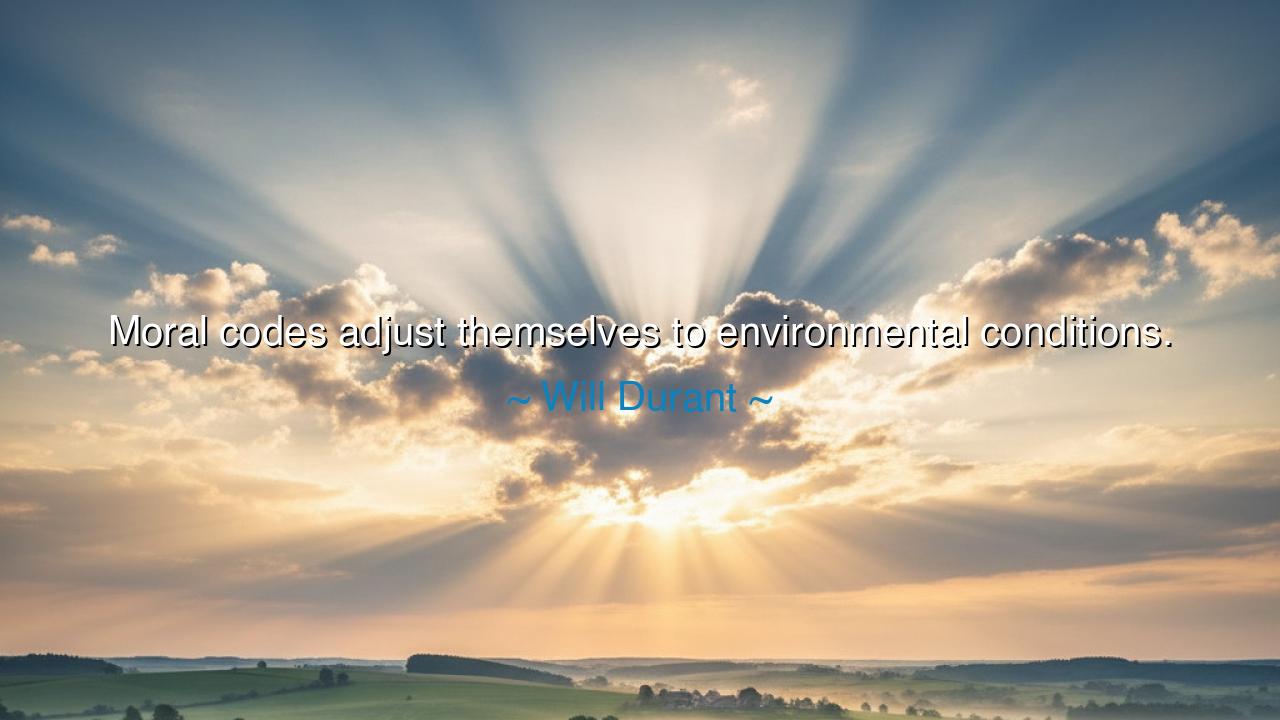
Moral codes adjust themselves to environmental conditions.






“Moral codes adjust themselves to environmental conditions.” Thus declared Will Durant, the philosopher-historian whose pen traced the great arc of human civilization. In this single sentence lies a truth both unsettling and profound—that the laws of morality, which men so often believe to be eternal and unchanging, are in fact shaped by the circumstances of their world. As the river is sculpted by its banks, so too is the conscience of a people molded by the land, the climate, and the conditions in which they live. Durant, who spent his life studying the rise and fall of nations, saw clearly that morality is not born in heaven, but grows from the soil of necessity.
In the earliest days of humankind, before temples and laws, men and women lived close to the earth. The hunter, the farmer, and the wanderer all learned their virtues from their environment. In the harshness of the desert, survival demanded hospitality; a stranger was a lifeline, not a threat. In the abundance of the tropics, where food was plentiful, generosity became easy and sharing natural. Among seafaring tribes, courage and cooperation were sacred, for a single act of cowardice could doom an entire crew. Thus, what was called “good” was that which sustained life; what was called “evil” was that which endangered it. Over centuries, these customs hardened into moral codes, enshrined in religion and law. But at their root, they were responses to the conditions of existence.
Durant saw this pattern repeated throughout history. The Spartans, living in a land of perpetual warfare and scarcity, exalted discipline, endurance, and martial virtue above all. Their morality was forged in the fire of their environment, where weakness meant death. Meanwhile, the Athenians, blessed with trade, art, and fertile soil, built their ethics around beauty, debate, and knowledge. Both societies believed themselves righteous, yet their righteousness arose from differing conditions. In this, Durant found no hypocrisy, but the rhythm of adaptation—the moral flexibility of humanity, endlessly reshaping its values to match its world.
And so it is even now. In times of peace, kindness is praised; in times of war, ruthlessness is honored. When resources are abundant, generosity flows easily; when famine grips the land, survival demands selfishness. We like to think our morality stands above such tides, but Durant reminds us that necessity is the architect of ethics. A starving man does not philosophize about virtue—he learns it anew from the pangs of hunger and the will to endure. As the environment changes, so too must the rules by which we live, or else we perish clinging to a past that no longer fits the present.
Consider the story of the Inuit peoples of the Arctic. In the frozen vastness where food was scarce, they practiced customs that might seem harsh to warmer hearts—such as abandoning the old or infirm when resources ran thin. To them, this was not cruelty but compassion, a final act of sacrifice to ensure the survival of the young. It was morality shaped by snow and silence, by a world where mercy took forms alien to comforted civilizations. Yet within that harshness lay profound humanity, a code born from balance with the land. Thus, Durant’s words remind us to judge not from comfort, but from understanding.
In the modern age, our environmental conditions have changed once more—not in climate alone, but in the very nature of life. We live in an era of abundance and technology, yet also of isolation and greed. Our moral codes must now adapt to new challenges: the pollution of the earth, the corruption of power, the distance between human hearts. What once served the tribe may no longer serve the planet. The wisdom of Durant’s insight urges us to evolve our ethics to meet the conditions of this age—to extend our sense of duty beyond family or nation, and embrace the whole of humanity and the living world as our moral sphere.
Let this truth, then, be remembered: morality is not a fixed law, but a living covenant between man and his world. As the earth changes, so must our understanding of right and wrong. The wise do not cling to the codes of yesterday; they listen to the voice of the present, and ask, “What does the world now require of me?” For the soul that refuses to adapt becomes like the tree that will not bend to the wind—it breaks.
Therefore, O seeker of wisdom, honor Durant’s lesson in your life. Let your moral code be firm in heart yet flexible in form. Seek not to preserve old virtues for their own sake, but to rediscover what virtue means in the world you inhabit. As the rivers shift and the seasons turn, let your conscience grow with them. For in that growth lies the true nobility of mankind: not in perfection, but in the eternal striving to live rightly in a changing world—a harmony between the spirit of man and the conditions of creation that sustain him.






AAdministratorAdministrator
Welcome, honored guests. Please leave a comment, we will respond soon